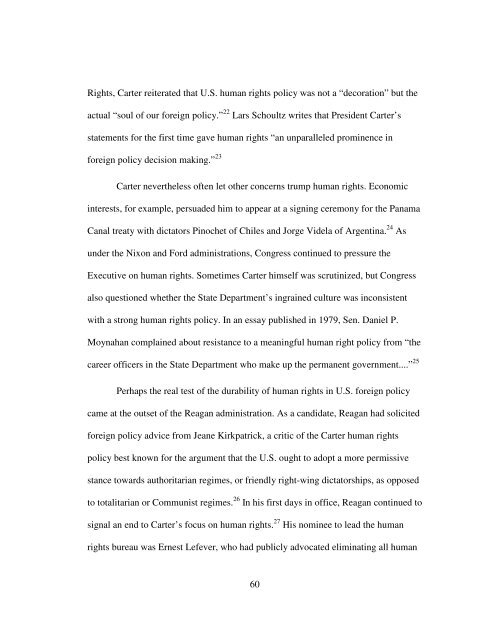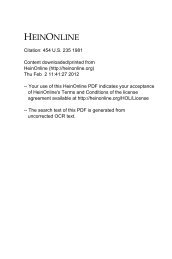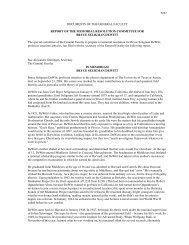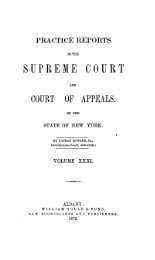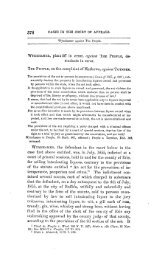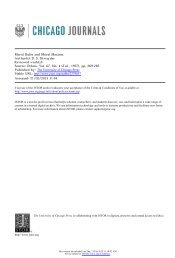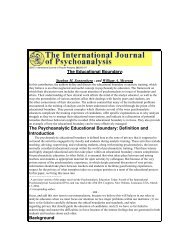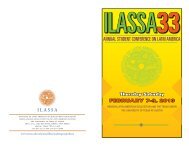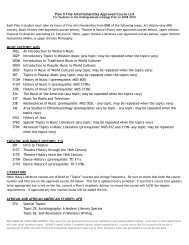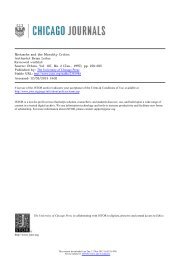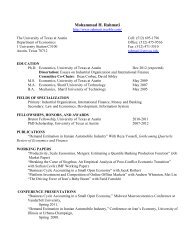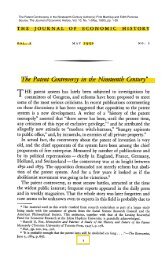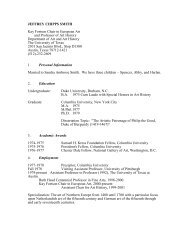Copyright by Gregory Krauss 2007 - The University of Texas at Austin
Copyright by Gregory Krauss 2007 - The University of Texas at Austin
Copyright by Gregory Krauss 2007 - The University of Texas at Austin
You also want an ePaper? Increase the reach of your titles
YUMPU automatically turns print PDFs into web optimized ePapers that Google loves.
Rights, Carter reiter<strong>at</strong>ed th<strong>at</strong> U.S. human rights policy was not a “decor<strong>at</strong>ion” but the<br />
actual “soul <strong>of</strong> our foreign policy.” 22 Lars Schoultz writes th<strong>at</strong> President Carter’s<br />
st<strong>at</strong>ements for the first time gave human rights “an unparalleled prominence in<br />
foreign policy decision making.” 23<br />
Carter nevertheless <strong>of</strong>ten let other concerns trump human rights. Economic<br />
interests, for example, persuaded him to appear <strong>at</strong> a signing ceremony for the Panama<br />
Canal tre<strong>at</strong>y with dict<strong>at</strong>ors Pinochet <strong>of</strong> Chiles and Jorge Videla <strong>of</strong> Argentina. 24 As<br />
under the Nixon and Ford administr<strong>at</strong>ions, Congress continued to pressure the<br />
Executive on human rights. Sometimes Carter himself was scrutinized, but Congress<br />
also questioned whether the St<strong>at</strong>e Department’s ingrained culture was inconsistent<br />
with a strong human rights policy. In an essay published in 1979, Sen. Daniel P.<br />
Moynahan complained about resistance to a meaningful human right policy from “the<br />
career <strong>of</strong>ficers in the St<strong>at</strong>e Department who make up the permanent government....” 25<br />
Perhaps the real test <strong>of</strong> the durability <strong>of</strong> human rights in U.S. foreign policy<br />
came <strong>at</strong> the outset <strong>of</strong> the Reagan administr<strong>at</strong>ion. As a candid<strong>at</strong>e, Reagan had solicited<br />
foreign policy advice from Jeane Kirkp<strong>at</strong>rick, a critic <strong>of</strong> the Carter human rights<br />
policy best known for the argument th<strong>at</strong> the U.S. ought to adopt a more permissive<br />
stance towards authoritarian regimes, or friendly right-wing dict<strong>at</strong>orships, as opposed<br />
to totalitarian or Communist regimes. 26 In his first days in <strong>of</strong>fice, Reagan continued to<br />
signal an end to Carter’s focus on human rights. 27 His nominee to lead the human<br />
rights bureau was Ernest Lefever, who had publicly advoc<strong>at</strong>ed elimin<strong>at</strong>ing all human<br />
60


